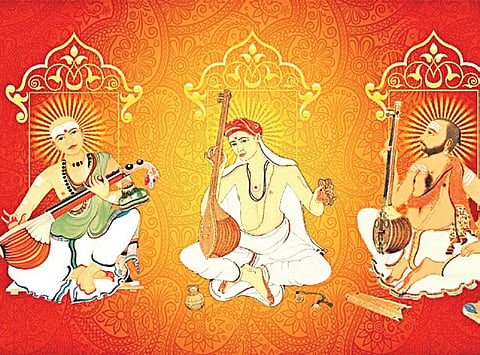

CHENNAI: A galaxy of great vaggeyakaras (who compose and sing the lyrics) and musicians were born either as contemporaries or in quick succession to enrich classical music by their wonderful compositions in 18-19th Centuries.
From the late 17th Century through the whole of the 18th Century, we had Maha Vaidyanatha Iyer, the great genius, Teerta Narayana Yati, Soni Venkataramana, Arunagirinathar and Oothukadu Venkatakavi, whose creative music was a boon to musicians. The 18th Century had the honour of giving us the immortal trinity — Syama Sastri, Saint Thyagaraja and Muthuswamy Dikshithar. It was during this period Carnatic music was modernised with a lakshya maarga by the scholar musicians and vaggeyakaras, with the patronage of royalty. During this period, new forms like pada varnams, tana varnams and swara jatis emerged forming the key aspects of Carnatic music as we know today.
Syama Sastri was the first among the trinity who composed songs in bhakthi ragas with rhythmic slant. Saint Thyagaraja (1767-1847) had a hereditary instinct for music and was taught by his mother Purandaradasa’s kritis. He excelled in devotional music towards Lord Rama. Muthuswamy Dikskhitar (1775-1835) composed songs mostly in Sanskrit. They never thought of preserving their songs to posterity as the trinity did not leave behind any written poem or work for the future.
A set of brilliant musicians trained in the gurukula system collected a good number of compositions of trinity and Kshetragna (1600-1680), a prolific Telugu poet and composer. One of the musicians Subbarama Dikshitar (1859-1906) produced Sangeetha Sampradaya Pradarshini that contains detailed information on the various aspects of raga lakshanas, gamakas, songs, and varnams, among other elements of Carnatic music. By the turn of 20th Century, we have got a Carnatic music which has a spontaneous flow of bhava and rasa, thanks to the efforts of vaggeyakaras whose sole aim was to infuse bhakthi in mankind.